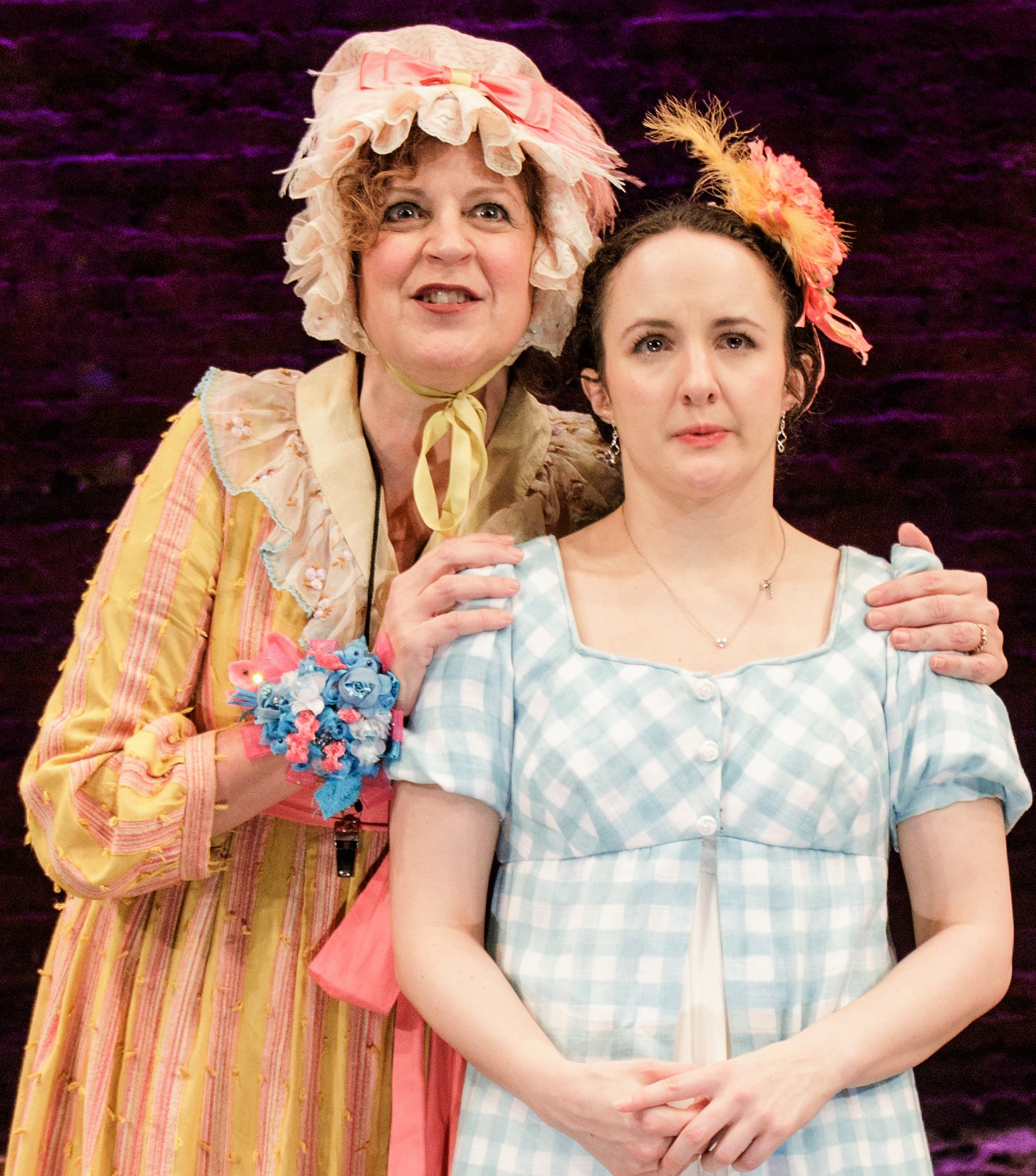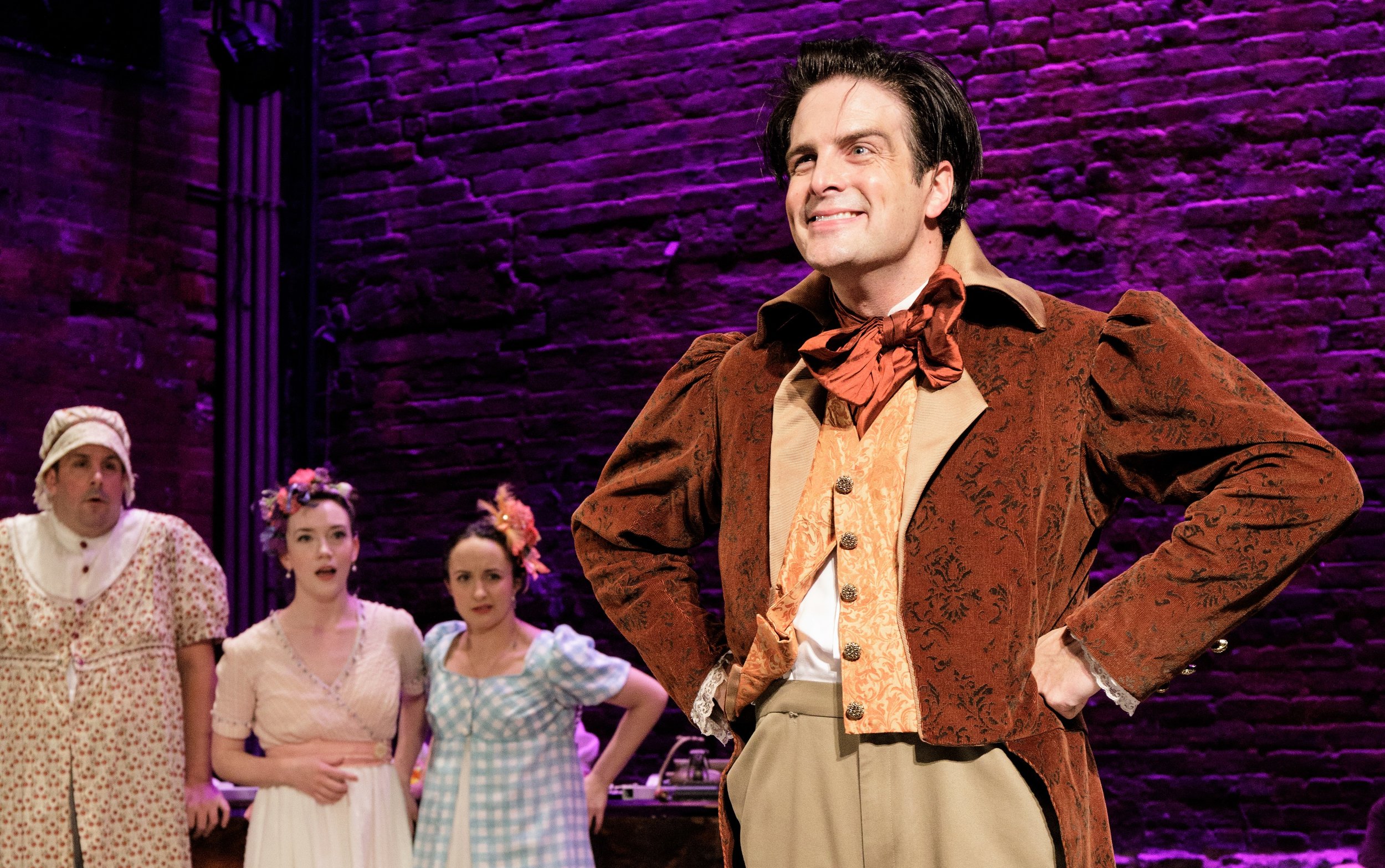Don’t underestimate Jane Austen. Her authorial voice, distinctively witty and humane, rings out above the Gothic din of early 19th-century fiction. Two centuries after her death, this middle-class provincial’s novels still enchant readers with their verisimilitude and authenticity, despite how radically manners and morals have changed.
A new stage adaptation of Pride and Prejudice, which premiered last summer in Garrison, N.Y., has arrived in Manhattan. The script for this Primary Stages–Hudson Valley Shakespeare Festival co-production is by Kate Hamill, whose dramatization of Austen’s Sense and Sensibility enjoyed a substantial run Off-Broadway in 2016.
Hamill, who also portrays protagonist Elizabeth Bennet, is a member of Bedlam, the audacious New York theater company that has staged Hamlet with four actors covering all roles. Last season, Hamill’s reworking of Thackeray’s Vanity Fair was the final production of the defunct Pearl Theatre Company. In Bedlam style, she uses a modest number of performers to tell complex stories. Pride and Prejudice features eight actors playing 14 sizable parts, as well as maids, butlers, and a major-domo.
John Tufts as Charles Bingley and Mark Bedard as his sister, Ms. [sic] Bingley in the Primary Stages/Hudson Valley Shakespeare Festival co-production of Pride and Prejudice. Above: Nance Williams as Mrs. Bennet and Kate Hamill as her daughter Elizabeth. Photographs by James Leynse.
Pride and Prejudice concerns two couples for whom the course of true love is farcically bumpy. The men, Fitzwilliam Darcy (Jason O’Connell) and Charles Bingley (John Tufts), are aristocrats, the former proud and arrogant, the latter diffident and earnest. The women, brainy Elizabeth and her beautiful sister Jane (Amelia Pedlow), are middle-class without prospects of inheritance. At a time when gentlewomen weren’t employed outside the home, Elizabeth and Jane’s economic expectations depend on advantageous marriage.
Hamill has eliminated numerous characters (including one of the five Bennet sisters) and simplified the plot. But the most memorable of Austen’s supporting figures remain: flighty, shallow Mrs. Bennet (Nance Williamson); her insouciant husband (Chris Thorn); obsequious Rev. Mr. Collins (Mark Bedard); practical-minded Charlotte Lucas (Thorn); and overbearing Lady Catherine de Bourgh (Kimberly Chaterjee).
The production, directed by Amanda Dehnert, is played on a nearly bare stage, which scenic designer John McDermott has littered with props that are visible throughout, not merely when in use. (Several, such as bright yellow tennis balls, are noticeably contemporary in design.) The actors stay on stage, whether or not they’re in the current scene, and make minimal wardrobe changes in full view of the audience.
What’s noticeably missing is the story’s historical context. What’s left is a Reader’s Digest reduction of Austen’s saga, with wildly anachronistic language, contemporary pop songs, and ragtag costumes by Tracy Christensen that offer a wacky pastiche of Regency fashion. It’s a postmodernist romp, all about the “game of love,” featuring a group of zanies whose frat-house deportment would have been unthinkable in the novelist’s rigidly hierarchical, manner-conscious world. In Austen’s literary universe, however, love is no game, at least not for women who (like the Bennet sisters) are destined for penury or the grudging charity of relatives if they don’t marry well.
Even when Hamill lifts words directly from the novel, she squeezes the essence of Austen out of them. For instance, that masterly scene (a favorite of English majors) in which the tedious Mr. Collins subjects Elizabeth to an unwelcome marriage proposal: Hamill’s script stays close to Austen’s dialogue, but her rowdy innovations undercut the source material.
Tufts (foreground), with (from left) Chris Thorn as Charlotte Lucas, Amelia Pedlow as Jane Bennet, and Hamill.
“Mr. Collins, I am sensible of the honour of your proposal,” says Elizabeth, “but it is impossible for me to do otherwise than to decline it.”
Hamill’s script then calls for stage business that thumbs its nose at the letter and spirit of Austen and the social decorum of her day: “[Collins] pursues [Elizabeth], she runs; worst game of tag ever.” In Hamill’s rendition, this scene becomes a knock-down, drag-out affair in which coarse physical comedy competes with what’s present of Austen’s elegance and wit. (The same is true of a later scene in which Darcy also tenders an unwelcome proposal.)
What saves the day for this production is faultless casting coupled with Dehnert’s fast-paced direction. Playing Elizabeth and Darcy as an appealing pair of Gen-X neurotics, Hamill and O’Connell display on-stage chemistry that’s a constant pleasure to watch. And the ensemble surrounding them—so adept at physical comedy, improv, and swift transformation from one character to another (often with only slight changes in costume and coiffure)—is as close to irresistible as any cast currently on a New York stage. As the evening progresses, the actors’ burlesque capers accelerate, with pratfalls, sight gags, and risqué digressions likely to distract all but the most devout Austen fans from this adaptation’s shortcomings.
Pride and Prejudice runs through Jan. 6, 2018, at the Cherry Lane Theatre (38 Commerce St.). Evening performances are at 8 p.m. Tue.–Sat.; matinees are at 2 p.m. Sat. and 3 p.m. Sun. (as of Dec. 19, matinees will be at 2 p.m. Wed. and Sat.); added performances at 2 p.m. on Dec. 13 and 22. Tickets are $82 and may be purchased by calling Ovationtix at (866) 811-4111 or visiting Ovationtix.com.



![John Tufts as Charles Bingley and Mark Bedard as his sister, Ms. [sic] Bingley in the Primary Stages/Hudson Valley Shakespeare Festival co-production of Pride and Prejudice. Above: Nance Williams as Mrs. Bennet and Kate Hamill as her daughter Elizab…](https://images.squarespace-cdn.com/content/v1/585832425016e17cbf7235be/1511743628670-6S9RSKDFTN6EIBMGPZM8/Pride+No.+1.jpg)

